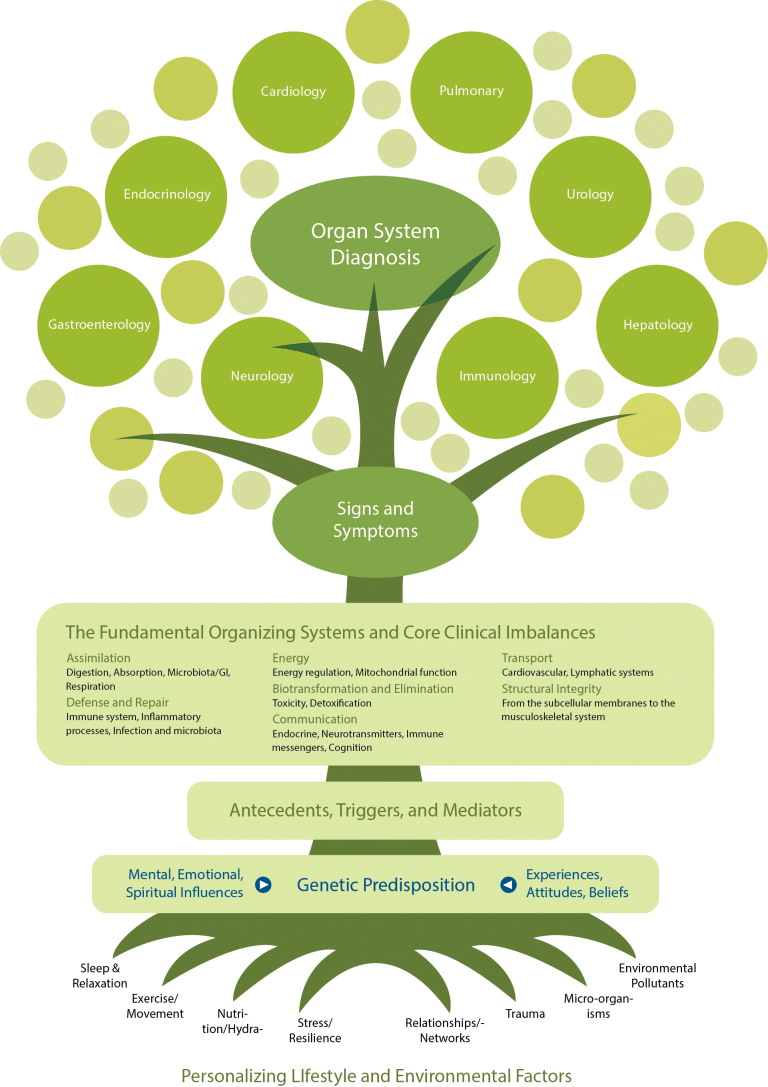
Newbridge
Functional Medicine
Understanding Functional Medicine in Minnesota
Understanding Functional Medicine
At Newbridge, our team of care providers is extensively trained in a Functional Medicine approach. The Functional Medicine model is based on an individualized, patient-centered, science-based approach that empowers patients and practitioners to work together to address the underlying causes of disease and promote optimal wellness. This means that we are determined to help patients by identifying the root cause of their health concerns, knowing that each person’s story is unique, which necessitates a bio-individualized approach to healing. By seeking to understand not just what symptoms a patient is experiencing but why, we can begin to unravel the complexities of chronic illness and disease. In doing so, we take into account an individual’s history, lifestyle factors, genetics, diet, and emotional wellness.
Functional Medicine & Chronic Illness
The rise in chronic illness at every age can seem daunting, and many of us experience some sort of chronic condition or know someone who does. In fact, 50% of adults have at least one chronic health condition and 25% of adults have two or more. In 2011, one study estimated that 43% of US children (32 million) currently have at least 1 of 20 chronic health conditions assessed, increasing to 54.1% when factoring in being overweight, obese, or at risk for developmental delays. Unfortunately, this number has continued to grow in the last nine years. Moreover, chronic illness accounts for more than 86% of all healthcare costs.
With an increase in healthcare costs, it would be assumed that health outcomes are then improving, however, the opposite may be true. The United States spends 1.5 to 2 times more per person on health care than other industrialized countries (per Organization for Economic Cooperation and Development), but comes in last in most categories of health outcomes, including infant mortality, percentage with multiple chronic diseases, and overall life expectancy.
Rather than identifying and managing disease and chronic illness, the Functional Medicine model is one that focuses on preventing and/or reversing illness, promoting health, and optimizing whole-body function. In fact, after a two-year study that examined 1,595 patients treated in Cleveland Clinic’s Center for Functional Medicine and 5,657 patients seen in primary care at a family health center, researchers found that functional medicine was associated with improvements in health-related quality of life. Additionally, Functional Medicine is highly cost-effective for patients as it focuses on prevention and health-promoting lifestyle changes, sustainable treatments that address the underlying causes of dysfunction, and result in restoring patients to health. This, in turn, prevents added healthcare costs later on.
The Functional Medicine Model
At Newbridge, our Functional Medicine practitioners spend a substantial and meaningful amount of time with each patient, listening to their histories, and examining the interactions between genetic, environmental, and lifestyle factors that may influence their long-term health as well as complex, chronic disease. Rather than a symptoms-centered approach, we focus on a patient-centered one that ensures that your care team is responsive and respectful of your goals, health-related needs, and values, which guide every clinical decision.
The Functional Medicine model can be conceptualized by the Functional Medicine Tree. For a tree to be healthy and flourishing, you need to support the most basic and essential elements first, the very foundation: the roots and soil. Likewise, if a tree is not healthy, the first place you should look for answers is within those same foundational elements.
Looking at the constellation of symptoms (the branches and leaves) can help reach a diagnosis, however, if we look there first and fail to recognize the interplay between the foundational elements, we may miss critical components to a patient’s story, which may prevent complete revitalization. In a more conventional approach, treating the symptoms with a prescription drug may be the end of the story, especially if someone’s symptoms improve. However, without treating the root cause and tending to the foundation, we may not be preventing the same symptoms from returning. Contrary to conventional medicine which treats the same set of symptoms the same way for each patient, the goal of Functional Medicine is to promote health and vitality in each patient with individually tailored approaches.
The 5 Principles of Functional Medicine
Functional medicine can be better understood by looking at each of its core principles. And here at Newbridge, we adhere to these principles as guiding rods that allow us to better assist you on your health journey.
Biochemical Individuality
All of us are unique. Functional medicine understands all people are genetically and biochemically set apart from one another in a myriad of ways. At Newbridge, we take into account these factors and look at patients individually, enabling us to treat you, not your disease.
Evidence-Based Approach
Your genetics, biochemistry, microbiome, age, gender, and lifestyle choices impact how diseases manifest and progress. Our functional medicine approach works to understand your whole being scientifically – with the most up-to-date evidence. This data allows us to treat you holistically, with science as our primary tool.
Enhanced Health Span
Functional medicine serves to enhance your health span, not just your lifespan. At Newbridge, we work to support you holistically and help to establish sustainable lifestyle changes that will allow your health to flourish. At Newbridge, your overall well-being and lasting health is the primary goal.
Health & Vitality
At Newbridge, we work to find the root cause or mechanism involved with any ailment, which ultimately reveals why your symptoms are present. In doing so, it’s much more likely to effectively eliminate disease and promote optimal health and vitality.
Dynamic Balance of Body & Mind
The internal and external body, mind, and spirit all function as one. Functional medicine recognizes the body’s capacity for self-regulation, which expresses itself through a dynamic balance of all your body’s systems. Our goal is to enhance the balance between your internal and external environments, allowing your body to heal itself with the least interference.


